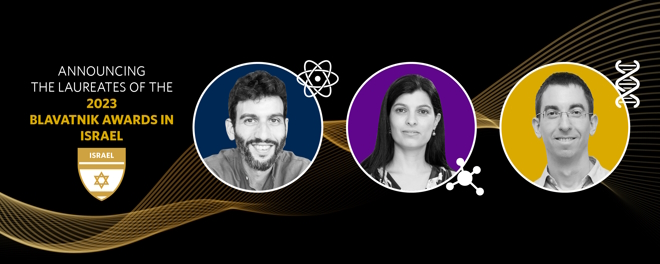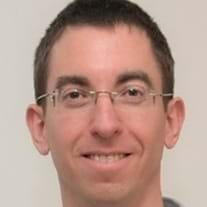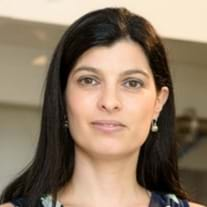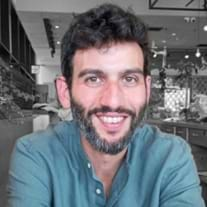Prestigious Blavatnik Awards for Young Scientists in Israel Announces 2023 Laureates

Jerusalem | April 3, 2023 – The Blavatnik Family Foundation, the Israel Academy of Sciences and Humanities, and The New York Academy of Sciences, announced today the Laureates of the 2023 Blavatnik Awards for Young Scientists in Israel.
This year’s Laureates, who will each receive US$100,000, are:
- Shai Carmi, PhD (Life Sciences) – The Hebrew University of Jerusalem – Recognized for fundamental contributions to the fields of population and medical genetics. In medical genetics, he has reported the first evaluations of a new technology for genetic testing of preimplantation embryos for complex (adult) diseases and traits. Through his groundbreaking work in population genetics, he has rewritten the demographic history of medieval Ashkenazi Jews.
- Rina Rosenzweig, PhD (Chemistry) – Weizmann Institute of Science – Recognized for discovering the regulatory mechanism by which a particular class of proteins, “chaperone” proteins, drive the innate ability of our cells to prevent and reverse protein aggregation—a phenomena associated with many neurodegenerative conditions including Alzheimer’s, Parkinson’s, and Huntington’s diseases. Harnessing and amplifying natural methods to reverse protein aggregation in cells paves the way to treatments for these conditions.
- Zvika Brakerski, PhD (Physical Sciences & Engineering) – Weizmann Institute of Science – Recognized for developing the first efficient encryption algorithm that allows cloud computers to perform computations on encrypted data without the need to first decrypt them. His algorithm has enormous potential to improve the security of cloud computing. In addition, he has also developed new cryptography algorithms to verify the output of quantum computations.
Recognizing Innovative Scientists
The Blavatnik Awards recognize outstanding, innovative scientists at the early stages of their careers for both their extraordinary achievements and their promise for future discoveries. The prizes are awarded to researchers aged 42 and younger for groundbreaking work in the disciplines of Life Sciences, Chemistry, and Physical Sciences & Engineering. The Blavatnik Awards in Israel sit alongside their international counterparts, the Blavatnik National Awards and Blavatnik Regional Awards in the United States, and the Blavatnik Awards in the United Kingdom.
The 2023 Blavatnik Awards for Young Scientists in Israel will be conferred at a ceremony held at the Peres Center for Peace & Innovation in Tel Aviv-Jaffa in June 2023. On June 6, 2023, from 10:00 AM to 1:00 PM IDT, the Laureates will present their research at a free public symposium at the Steinhardt Museum of Natural History at Tel Aviv University. You can learn more about this event HERE.
The Laureates will join a cadre of young scientists from across Israel who have been honored by the Blavatnik Awards in Israel since the launch of the Awards in 2017. In addition, the Laureates will become part of the international Blavatnik Science Scholars community, whose recipients will have been awarded prizes totaling US$15.4 million by the close of 2023. Approximately 60 percent of all recipients are immigrants to the country in which they were recognized. Moreover, honorees hail from 52 countries across six continents, reflecting the fact that groundbreaking science is a global enterprise.
“Israel’s science and technology improves lives and constantly expands the boundaries of discovery,” said Len Blavatnik, Founder and Chairman of Access Industries and Head of the Blavatnik Family Foundation. “We are proud to honor these exceptional young scientists and their significant contributions to the global scientific community.”
From the Academy Presidents
Nicholas B. Dirks, President and CEO of The New York Academy of Sciences, said “Science and technology are both considered Israel’s most developed sectors, which follows from the fact that Israel’s universities are training some of the most talented scientists in the world. On behalf of The New York Academy of Sciences, we are proud to recognize the outstanding science and scientists represented by the 2023 Blavatnik Awards in Israel Laureates, including the first Laureate from Hebrew University of Jerusalem. We congratulate them and their institutions.”
Professor David Harel, President of The Israel Academy of Sciences and Humanities, said “Today, more than ever, we value the continuing collaboration with the Blavatnik Family Foundation and The New York Academy of Sciences to maintain the tradition of bestowing these distinguished awards upon outstanding young scientists in Israel. It is crucial to continue to support and invest in Israel’s next generation of scientists, both for the benefit of the international scientific community and to maintain the status of Israeli science in the forefront of the global research world.”
During the nomination period for the 2023 Blavatnik Awards for Young Scientists in Israel, 40 nominations were received from eight universities across the country. Members of the Awards’ Scientific Advisory Council, which includes Nobel Laureates, Professors Aaron Ciechanover and David Gross and Professor Sir Richard Roberts, along with former Chairman of the Israel Space Agency, Professor Isaac Ben-Israel, were also invited to submit nominations. Three distinguished juries—composed of leading scientists representing the three disciplinary categories and led by Israel Academy members—selected the 2023 Laureates.
About the Blavatnik Awards for Young Scientists
The Blavatnik Awards for Young Scientists, established by the Blavatnik Family Foundation in 2007 and independently administered by The New York Academy of Sciences, began by identifying outstanding scientific talent in New York, New Jersey, and Connecticut. In 2014, the Blavatnik National Awards were created to recognize faculty-rank scientists throughout the United States. In 2017, the Awards were further expanded to honor faculty-rank scientists in the United Kingdom and Israel. For updates about the Blavatnik Awards for Young Scientists, please visit http://www.blavatnikawards.org or follow us on Twitter and Facebook @BlavatnikAwards.
About the Blavatnik Family Foundation
The Blavatnik Family Foundation supports world-renowned educational, scientific, cultural, and charitable institutions in the United States, the United Kingdom, Israel, and across the globe. Led by Sir Leonard Blavatnik, founder and chairman of Access Industries, the Foundation advances and promotes innovation, discovery, and creativity to benefit the whole of society. Over the past decade, the Foundation has contributed more than $1 billion to over 250 organizations. See more at www.blavatnikfoundation.org
About The Israel Academy of Sciences and Humanities
The Israel Academy of Sciences and Humanities is Israel’s flagship scientific institution. It was established by law in 1961 and acts as a national focal point for Israeli scholarship in all branches of the sciences, social sciences, and humanities. The Academy’s membership comprises 141 of Israel’s most distinguished scientists and scholars in its two sections―the Sciences Section and the Humanities Section. It is tasked with promoting Israeli scientific excellence, advising the government on scientific matters of national interest, publishing scholarly research of lasting merit, and maintaining active contact with the broader international scientific and scholarly community. For more information about The Israel Academy of Sciences and Humanities, please visit: www.academy.ac.il.
For further information, please contact:
Liel Edry: liel@kamir-e.com +972-50-8655-305
For US Inquiries, please contact:
Kamala Murthy, Blavatnik Awards Communications Kmurthy@nyas.org+1-212-298-3740
About the Laureates

Life Sciences:
Shai Carmi, PhD, Associate Professor, the Faculty of Medicine, the Hebrew University of Jerusalem
Prof. Shai Carmi uses genetic data and mathematical modeling to illustrate the past and inform the future. His research combines data analysis and algorithms to fill in gaps in human history and improve methods for genetic testing.
DNA can teach us about the history of a population. Carmi’s work has focused on developing methods that use genetic data to understand the current and past demography of isolated populations. Through the pioneering analysis of DNA sequences from present-day and 14th-century Ashkenazi Jews, Carmi’s work discovered a previously unknown division among the medieval population and estimated how remarkably small the population remained throughout the Middle Ages.
Several recent studies have identified genetic variants associated with disease, suggesting that DNA can serve as an indicator of future disease risk. Carmi is spearheading the application of genetic risk prediction techniques in Israel, in hopes of identifying high-risk individuals and informing efforts of personalized screening and prevention.
In reproductive medicine, Carmi and his colleagues have developed affordable and accurate methods for preimplantation genetic testing on whole-genome sequencing of IVF embryos. This technique may be able to screen embryos not only for severe childhood diseases but also for “complex” adult diseases, such as heart attack, cancers, schizophrenia, diabetes, or Crohn’s disease. Carmi showed that screening embryos for complex diseases could result, under some circumstances, in significant risk reductions for the future children. Importantly, Carmi is also leading discussions of ethical, social, and clinical difficulties associated with the implementation of this technology.
Chemistry:
Rina Rosenzweig, PhD, Senior Scientist, Department of Chemical and Structural Biology, Weizmann Institute of Science
The healthy function of our bodies’ cells relies on the carefully orchestrated interactions of thousands of function-specific proteins. When these interactions break down because proteins misfold or aggregate, severe neurodegenerative conditions like Alzheimer’s, Parkinson’s, and Huntington’s diseases can occur. Dr. Rosenzweig is uncovering the secrets behind our cells’ innate quality control system, molecular chaperones: a specific class of proteins that assists other proteins to fold, refold, and repair themselves. Rosenzweig has developed deep insight into how specific molecular chaperones prevent and reverse protein misfolding and aggregation on an atomic level. This knowledge led to her landmark discovery of how two specific molecular chaperones are triggered to break up protein aggregations associated with Parkinson’s disease. The discovery of this “molecular switch” will hopefully lead to the development of novel therapeutic agents that target Parkinson’s and other aggregation-related disorders.
Her work goes beyond neurodegenerative diseases for applications related to cancer. Rosenzweig recently demonstrated specific modulations to molecular chaperones that could inhibit cancer cell growth without impacting other functions, potentially offering new cancer treatments with far fewer side effects.


Physical Sciences & Engineering:
Zvika Brakerski, PhD, Associate Professor, Department of Computer Science and Applied Mathematics, Weizmann Institute of Science
Prof. Brakerski is a pioneer in cryptography. He has continually introduced novel cryptographic solutions with far-reaching practical implications on the security of cloud computing and quantum computing. Brakerski developed the first efficient encryption algorithm that allows computers to directly perform computations on encrypted data without the need to first decrypt them. In other words, the cloud computers do not know the data they are processing at all. His algorithm, dubbed FHE (fully homomorphic encryption), has huge potential to improve the security of cloud computing, and is now developed and implemented by many companies worldwide.
He has also realized several major breakthroughs related to the use of cryptography in quantum computing. Brakerski’s work laid the foundation to construct various building blocks that are frequently used to build quantum cryptographic protocols.
In addition, he showed how a classical computing system can “control” the behavior of a quantum computer using cryptography. This may allow us to develop secure “cloud quantum-computers” where the quantum cloud can be supervised by the classical user.
About The New York Academy of Sciences
The New York Academy of Sciences is an independent, not-for-profit organization that since 1817 has been committed to advancing science for the benefit of society. With more than 20,000 Members in 100 countries, the Academy advances scientific and technical knowledge, addresses global challenges with science-based solutions, and sponsors a wide variety of educational initiatives at all levels for STEM and STEM-related fields. The Academy hosts programs and publishes content in the life and physical sciences, the social sciences, nutrition, artificial intelligence, computer science, and sustainability. The Academy also provides professional and educational resources for researchers across all phases of their careers. Please visit us online at www.nyas.org.